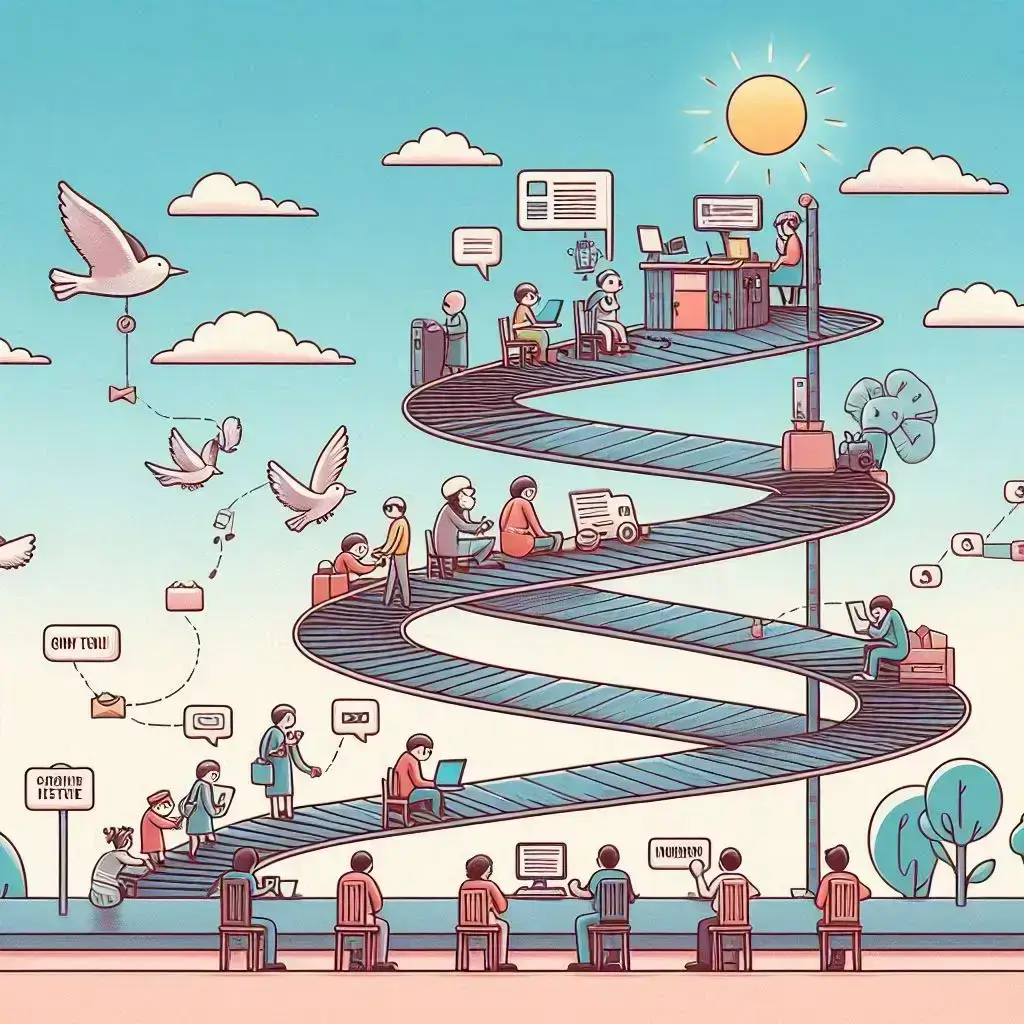In today’s fast-paced digital world, blogging isn’t just about writing; it’s a powerful way to connect, share ideas, and spark change. The importance of blogging can’t be underestimated. Imagine having the ability to voice your thoughts, inspire others, and build a community around your passions—all from your own little corner of the internet. It’s exciting, isn’t it?
With over 600 million blogs online, according to Statista, the blogging universe is vast and diverse. Have you ever thought about how your unique perspective could resonate with others? Whether you’re an aspiring writer or simply curious about blogging, exploring this medium can open up a world of opportunities. It helps establish your authority in your field while connecting you with like-minded individuals.
In this article, we’ll dive into the definition of blogging, trace its fascinating history of blogging, and uncover its profound impact of blogging on both bloggers and their audiences. Get ready to discover how blogging can empower you and shape the digital landscape! If you’re looking to start your own blog, check out my post on how to start a blog.
Understanding the Definition of Blogging
So, what exactly is blogging? At its core, blogging is the act of creating and publishing content online, usually in the form of articles or posts. It’s a platform for sharing thoughts, experiences, and knowledge on virtually any topic you can imagine. From personal stories to professional insights, blogs invite readers into your world.
The term “blog” originated from “weblog,” referring to online journals that first appeared in the late ’90s. Today, blogs can exist as standalone websites or part of larger platforms. As a blogger, you have the freedom to express your views, share your expertise, or promote products and services.
What makes blogging truly special is its interactive nature. Readers can leave comments, share posts, and engage in discussions, creating a vibrant community around your blog. This interaction enriches the content and fosters meaningful connections. Blogging isn’t just about writing; it’s about sharing and connecting in a way that can genuinely influence others.
The Importance of Blogging in Today’s Digital World
The significance of blogging goes beyond personal expression. For individuals, it’s a chance to share expertise and connect with others. For businesses, blogs enhance visibility, drive traffic, and improve search engine rankings. By consistently producing quality content, you can position yourself as a thought leader in your industry.
Blogging is also a powerful tool for community engagement. Readers often interact through comments, sharing their perspectives and asking questions. This two-way communication builds loyalty and fosters a sense of belonging. When readers feel connected to you, they’re more likely to return for future posts and share your content with their networks.
Moreover, blogging offers a creative outlet for self-expression. It allows you to explore your passions and refine your voice. Writing can be therapeutic, providing a rewarding way to articulate your thoughts and feelings.
Additionally, blogs serve as valuable resources for information and education. People turn to blogs for advice, tips, and insights. Whether someone seeks travel recommendations or career guidance, blogs provide easily digestible content that empowers readers to make informed decisions.
In essence, the importance of blogging lies in its ability to connect people, foster creativity, and provide valuable content that informs and inspires.

A Brief History of Blogging: How It All Started
Let’s take a step back in time to explore the fascinating history of blogging. It all began in the late 1990s with the emergence of online diaries. These early blogs were personal, allowing individuals to share their thoughts and experiences with a small audience. The term “weblog” was coined in 1999, and soon after, platforms like Blogger made it easy for anyone to create a blog.
As we moved into the early 2000s, blogging evolved from a personal hobby to a professional medium. Businesses began recognizing the potential of blogging for marketing and communication. Companies created blogs to engage with customers, share news, and showcase their expertise. This marked the birth of business blogging, which aimed to establish authority and drive traffic.
By the mid-2000s, blogging had gained mainstream popularity. Platforms like WordPress and Tumblr made it even easier to create and maintain blogs. Niche blogs began to flourish, covering everything from fashion to technology, and bloggers formed communities around shared interests.
Today, blogging is a global phenomenon, with millions of active blogs spanning every conceivable topic. The rise of social media has further transformed the landscape, allowing bloggers to reach wider audiences and engage with readers in real-time. Blogging continues to grow and adapt, reflecting the dynamic nature of online communication.
The Impact of Blogging on Society and Communities
The impact of blogging is profound and far-reaching. It democratizes information, giving everyone a voice in the conversation. In a world where traditional media often controls the narrative, blogging has opened the floodgates for diverse perspectives. Anyone with internet access can share their thoughts and ideas, shaping public opinion and influencing culture.
Bloggers can drive social change by highlighting important issues. Their unique viewpoints can spark debates, raise awareness, and inspire action. For instance, environmental bloggers have mobilized communities to address climate change through informative posts and actionable tips. You can read more about this on platforms like Medium and The Guardian.
Moreover, blogs serve as educational resources. Many readers seek out blogs for advice, tips, and insights on various subjects. Blogs provide valuable content that informs and encourages critical thinking. From cooking tips to personal finance guides, these resources empower readers to make informed choices in their lives.
Blogging also fosters community building. Readers engage with bloggers through comments and social media, creating a sense of belonging. This connection can be especially beneficial for marginalized groups, providing solidarity and support through shared experiences.
In summary, the impact of blogging is immense. It amplifies voices, influences public discourse, and fosters connections among individuals. Blogging empowers writers and enriches the lives of readers by providing diverse perspectives and valuable information.
Exploring Different Types of Blogging
There are numerous types of blogging, each catering to different audiences and purposes. Here are some popular categories:
- Personal Blogs: Focused on individual experiences and stories, these blogs allow bloggers to share their thoughts, emotions, and life events. They create a relatable connection with readers.
- Professional Blogs: Targeting industry-specific topics, these blogs allow professionals to share expertise, discuss trends, and establish authority in their fields.
- Niche Blogs: Concentrating on specialized interests, niche blogs cater to specific audiences. Topics can range from travel and food to technology and fashion, attracting dedicated followers.
- Business Blogs: Companies use blogs to promote their products and services while providing valuable content to customers. These blogs enhance brand visibility and engage audiences.
- Guest Blogs: Involving writing for another blogger’s site, guest blogging allows bloggers to reach new audiences, build relationships, and enhance their credibility.
Each type of blogging serves a unique purpose, enabling individuals to express themselves and share valuable insights.
Essential Blogging Tools and Platforms
Starting a blog is easier than ever, thanks to various tools and platforms available today. Popular options include WordPress, Blogger, and Medium. These platforms offer user-friendly interfaces, making it simple for anyone to create and manage a blog.
WordPress is particularly favored for its flexibility and customization options. With thousands of themes and plugins, bloggers can create a site that reflects their style and needs. Blogger, owned by Google, is another straightforward option for beginners, offering essential blogging features.
Medium emphasizes writing and storytelling, allowing users to publish content without the need for a website design. This simplicity attracts writers who want to focus on their craft rather than the technical aspects of blogging.
Essential tools for bloggers include content management systems, analytics software, and social media management tools. Google Analytics helps track audience behavior and engagement, providing valuable insights for improvement. You can learn more about Google Analytics here.
Social media management tools like Buffer and Hootsuite enable bloggers to schedule posts and engage with followers across various platforms, enhancing visibility and driving traffic back to the blog.
In summary, choosing the right tools and platforms is vital for successful blogging. They lay the foundation for creating engaging content and connecting with your audience.
Embracing the World of Blogging
In conclusion, blogging is an essential component of the digital landscape. It empowers individuals to share their voices, connects communities, and influences public discourse. Whether for personal expression or professional growth, the significance of blogging continues to grow.
If you’ve ever considered starting a blog, now is the perfect time to dive in! With countless resources at your fingertips, anyone can become a blogger and share their unique perspective with the world. Embrace the opportunity to inspire, educate, and connect with others through the power of blogging!

